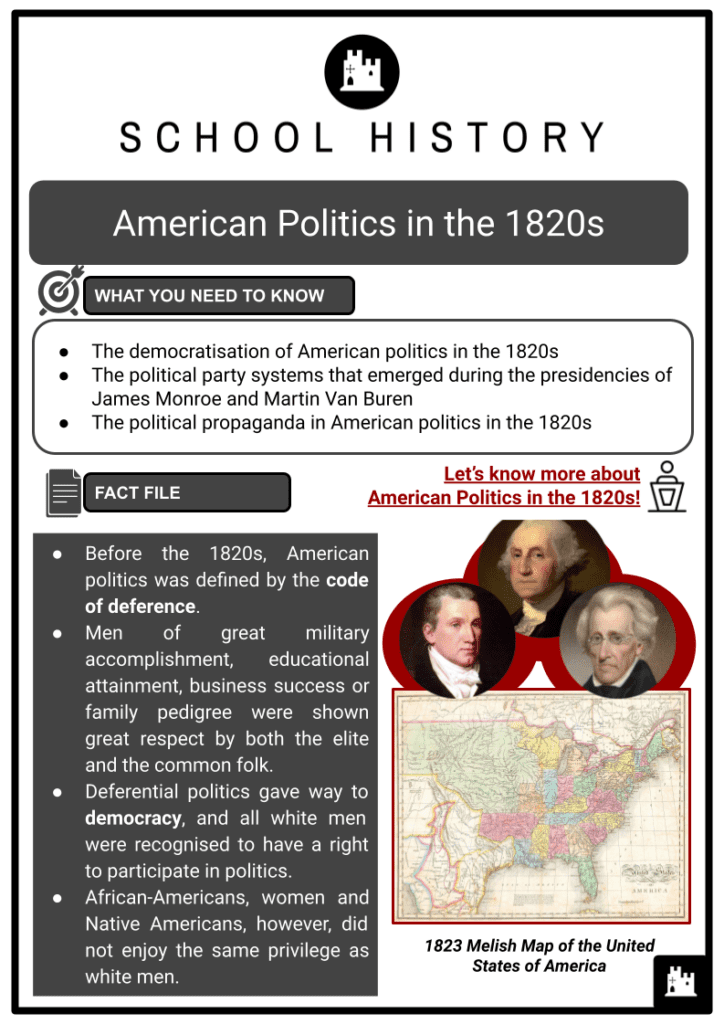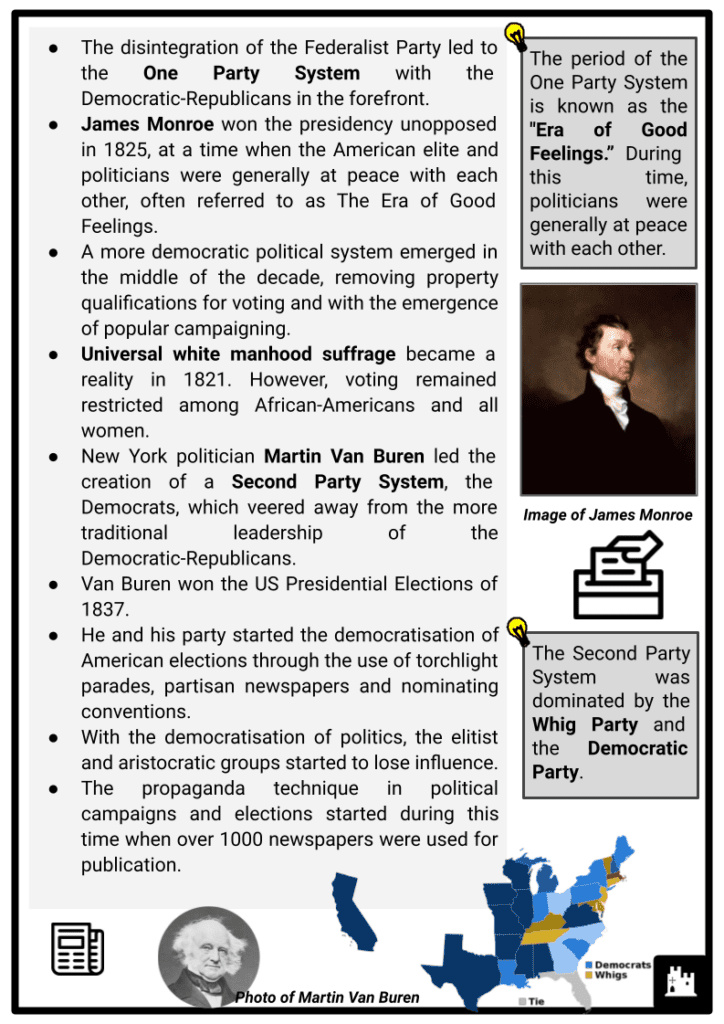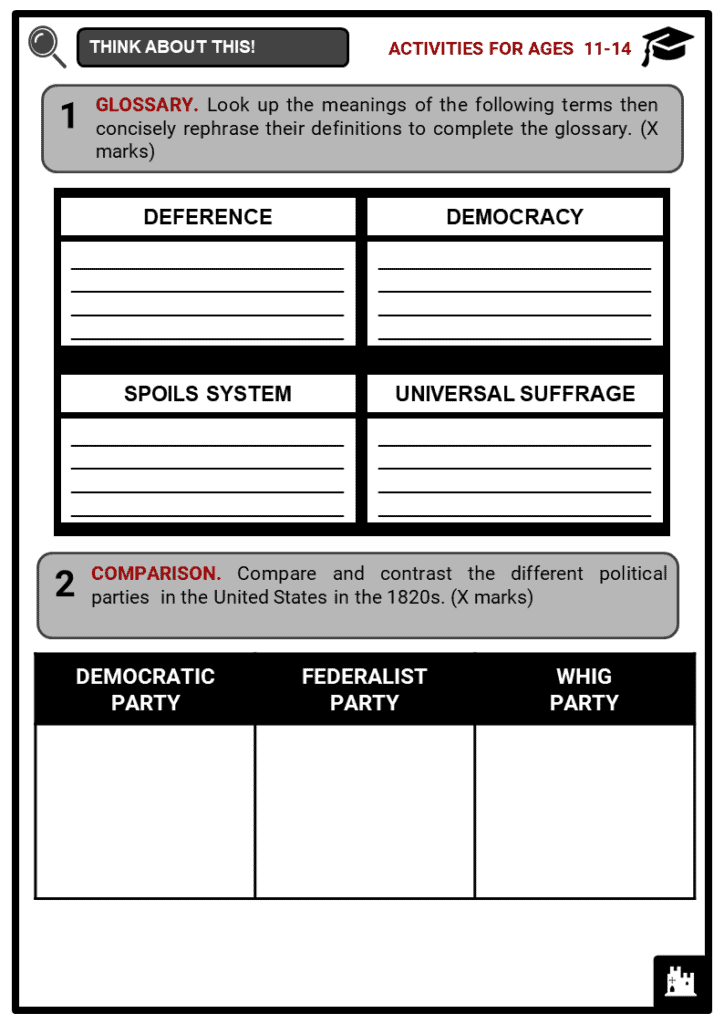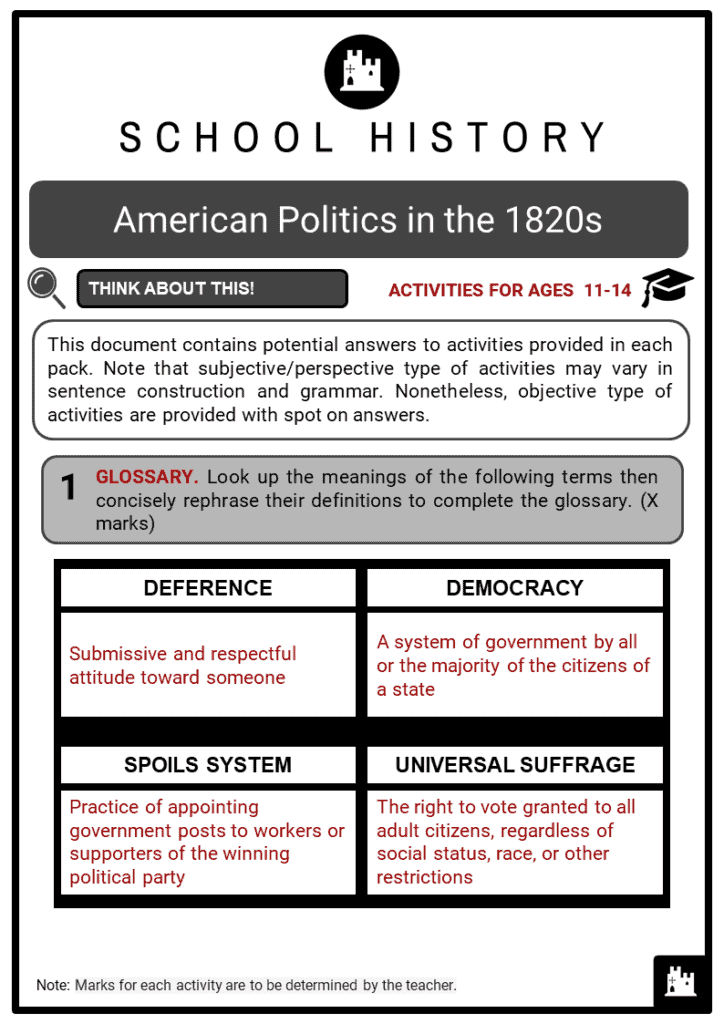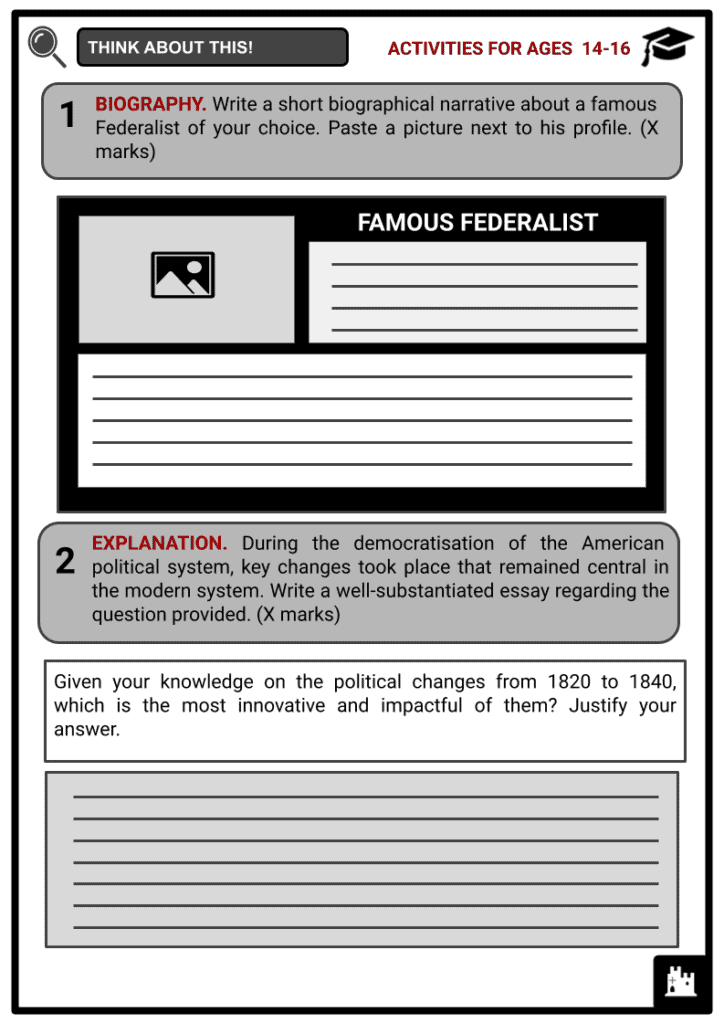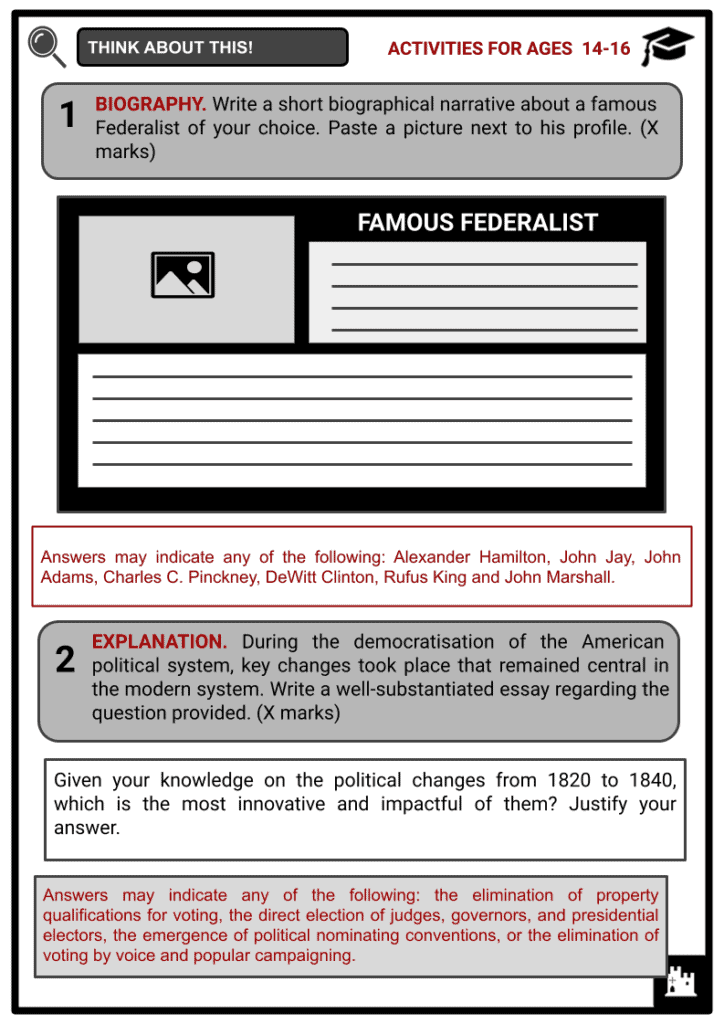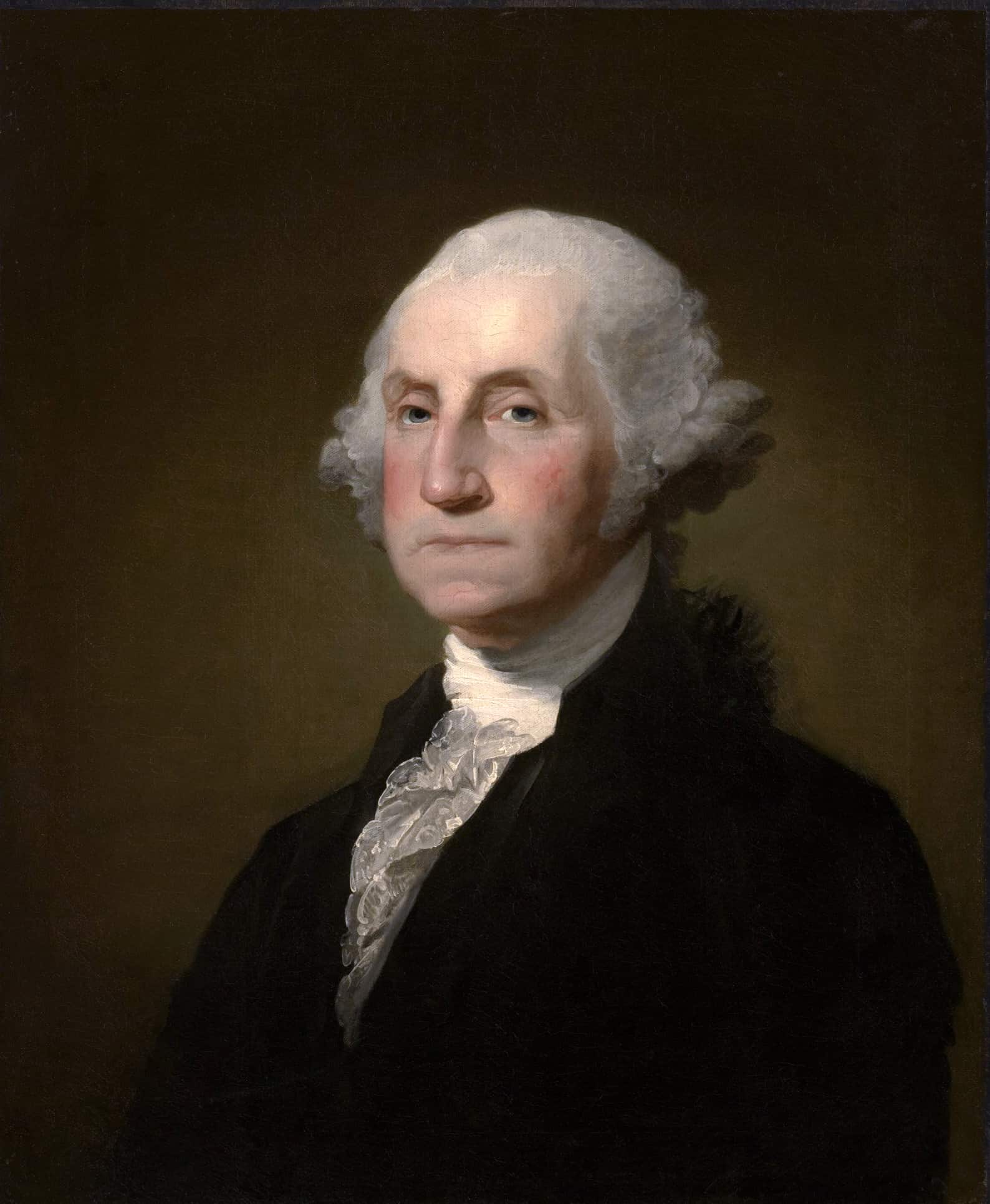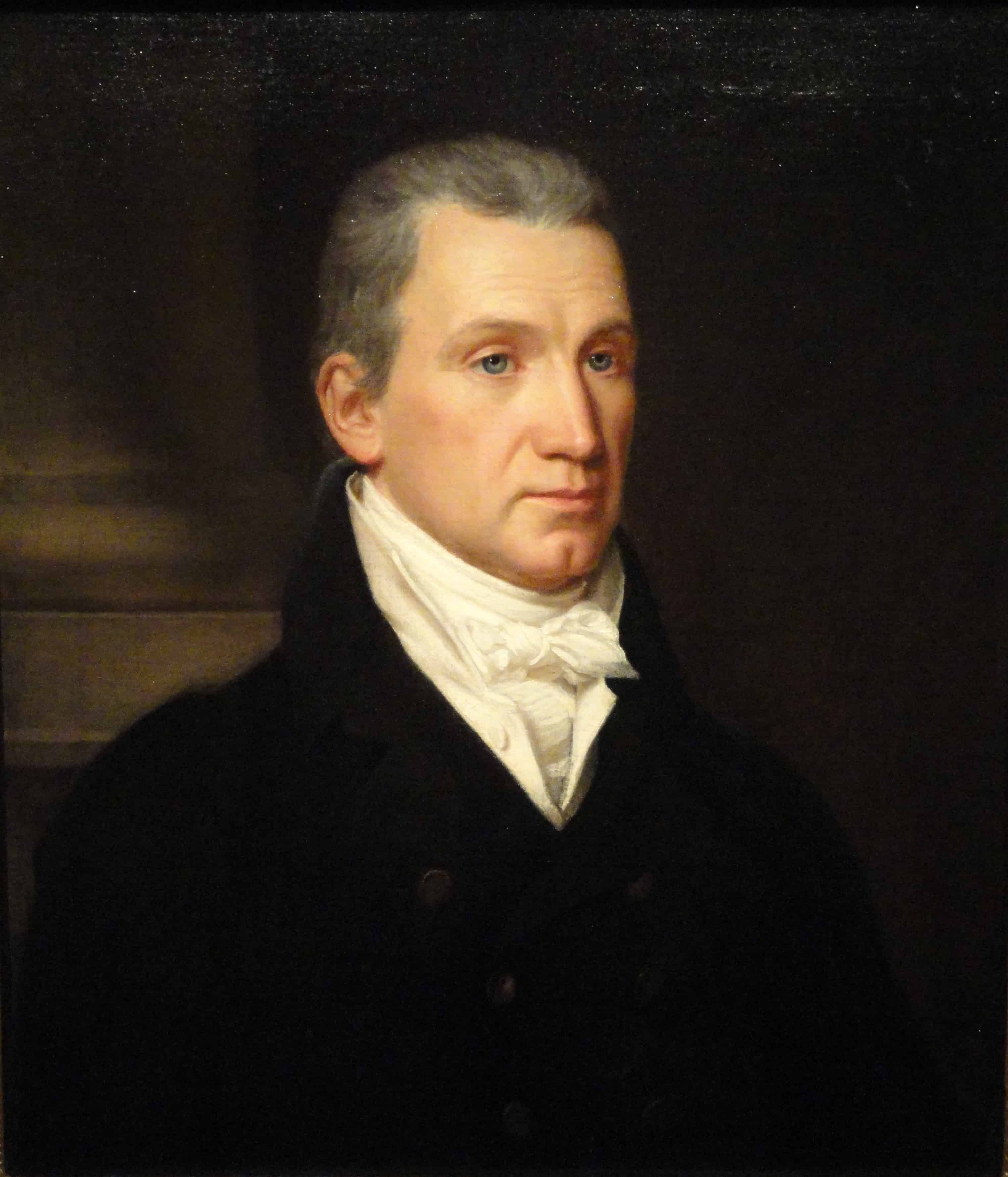Download American Politics in the 1820s Worksheets
Do you want to save dozens of hours in time? Get your evenings and weekends back? Be able to teach American Politics in the 1820s to your students?
Our worksheet bundle includes a fact file and printable worksheets and student activities. Perfect for both the classroom and homeschooling!
Table of Contents
Add a header to begin generating the table of contents
Summary
- The democratisation of American politics in the 1820s
- The political party systems that emerged during the presidencies of James Monroe and Martin Van Buren
- The political propaganda in American politics in the 1820s
Key Facts And Information
Let’s know more about American Politics in the 1820s!
- Before the 1820s, American politics was defined by the code of deference.
- Men of great military accomplishment, educational attainment, business success or family pedigree were shown great respect by both the elite and the common folk.
- Deferential politics gave way to democracy, and all white men were recognised to have a right to participate in politics.
- African-Americans, women and Native Americans, however, did not enjoy the same privilege as white men.
- The period of the One Party System is known as the "Era of Good Feelings.” During this time, politicians were generally at peace with each other.
- The disintegration of the Federalist Party led to the One Party System with the Democratic-Republicans in the forefront.
- James Monroe won the presidency unopposed in 1825, at a time when the American elite and politicians were generally at peace with each other, often referred to as The Era of Good Feelings.
- A more democratic political system emerged in the middle of the decade, removing property qualifications for voting and with the emergence of popular campaigning.
- Universal white manhood suffrage became a reality in 1821. However, voting remained restricted among African-Americans and all women.
- New York politician Martin Van Buren led the creation of a Second Party System, the Democrats, which veered away from the more traditional leadership of the Democratic-Republicans.
- Van Buren won the US Presidential Elections of 1837.
- He and his party started the democratisation of American elections through the use of torchlight parades, partisan newspapers and nominating conventions.
- With the democratisation of politics, the elitist and aristocratic groups started to lose influence.
- The propaganda technique in political campaigns and elections started during this time when over 1000 newspapers were used for publication.
- The Second Party System was dominated by the Whig Party and the Democratic Party.
Politics of the Early Days
- In the 1790s, the Federalists were at the top of the American political space, led by Washington, Hamilton and Adams.
- At the time, American politics was defined by the code of deference. Men of great military accomplishment, educational attainment, business success or family pedigree were shown great respect by both the elite and the common folk.
- Famous Federalists:
- Alexander Hamilton
- John Jay
- John Adams
- Charles C. Pinckney
- DeWitt Clinton
- Rufus King
- John Marshall
- The code of deference was in tandem with the Republican virtues, therefore Republican statesmen received deferential treatment by default.
- George Washington, for instance, was held in such high regard that his decisions and actions were considered to be above
Washington and his allies established a standard of leadership based on virtue and honesty. - Except for John Adams, all other early Presidents after Washington, including Thomas Jefferson, James Madison and James Monroe, were from enslaver aristocracy from the elite of Virginia.
- However, the period between the 1800s and 1820s saw the gradual decline of the Federalist Party. In 1816, when Democrat James Monroe defeated Rufus King, the Federalist Party never fronted another Presidential candidate.
The Age of Democracy
- Over time, deferential treatment gave way to democracy.
- However, democracy was only limited to white men, who, apart from the elite, didn’t have the right to participate in elections.
- Women, African-Americans and Native Americans continued to suffer disenfranchisement.
- Before the 1820s there were state-imposed property qualifications for voting in the face of opposition by many who argued universal white male suffrage.
- New states, in order to attract immigrants, changed their constitution to remove property ownership as a voting qualification.
- Vermont and Kentucky, after their admission to the Union in 1791 and 1792, granted the right to vote to all white men regardless of whether they owned property or paid taxes.
- Ohio maintained a minor tax requirement, but Indiana, Illinois and Alabama removed their tax limitations in 1816, 1818 and 1819 respectively.
- Mississippi restricted the right in 1817 but later expanded in 1832, while in Connecticut the Federalists fell out of favour in 1818 and allowed for the voting of all white men who paid taxes or served in the state militia.
- New York amended its constitution between 1821 and 1822 and removed property qualifications to voting.
- Race replaced the voting qualifications, and the states changed their constitution to reflect the shift.
- New Jersey, for instance, was explicit in its provisions against black voting.
- In 1814, Connecticut removed Black people's rights to vote, followed by New York in 1822.
Party Politics and the Elections of 1824
- Political party arrangements and influence also changed significantly in the years after the war of 1812. This was primarily in New York where the Tammany Society had significant influence.
- The Tammany Society is a political group founded in New York. It became the centre for Democratic-Republican Party politics in New York in the early 19th century.
- Initially, the society was not political but then it started gaining a lot of political power. No one would successfully ascend into leadership without their support.
- The Republican affiliate was called the Bucktail Republican faction.
- The Bucktail gained political popularity by appealing to the masses and not the elite.
- Their greatest achievement was lobbying for the amendment of the New York Constitution of the 1820s.
- The Constitution had a provision for a Council of Appointment that selected local officials such as the sheriffs and county clerks.
- They managed to replace the Council of Appointment with a direct vote by the people.
- Van Buren, the then leader of the Tammany Society, could nominate and successfully support his candidate of choice because of his influence.
- He, therefore, awarded those loyal to him with political leadership positions, thus ushering the politics of patronage.
- The system was called the Spoils System, from the old adage, “to the victor belongs the spoils.”
- At the national level, the elections of 1824 were a game changer. There were tens of thousands of new voters participating.
The Era of Good Feelings
- After the war of 1812, The Federalist Party was destroyed. James Monroe’s 1818 administration was the start of the Democratic-Republicans’ dominance in the American political system.
- James Monroe’s reelection until 1825 has often been called the Era of Good Feelings due to this one-party dominance.
- During this time, American politics was ruled by deference.
- There were no existing political parties other than the Democratic-Republicans, which found general support by continuing major economic policies since the time of Alexander Hamilton and the Federalists.
- These policies constitute a national bank, protective tariffs to support American manufactures, and federally funded internal improvements.
- American citizens had little power in choosing their executive leaders amounting to only 30 percent of adult white males.
- Most states imposed property and taxpaying requirements on white male adults, who conduct their vote through voice.
Rise of Democratic Politics
- The American political system became more democratic between 1820 and 1840, the key qualities of which remained central in the modern system.
- The changes included...
the elimination of property qualifications for voting, the direct election of judges, governors and presidential electors, the emergence of political nominating conventions, the elimination of voting by voice, and popular campaigning. - The most innovative of these changes was the abolition of property qualifications for voting and householding. The ongoing economic downturns have led to demands for a more democratic political system. Under the new constitution of 1821, all white male adults were allowed to vote, so long as they paid their taxes and/or had served in the military.
- Five years later, all these restrictions were lifted among all white male adults.
- By 1840, suffrage to all white male adults was a reality except in the states of Louisiana, Rhode Island and Virginia.
- In addition, states had also allowed immigrants to vote, so long as they had declared their intention to become citizens.
Van Buren and the Second Party System
- The democratic spirit that changed the American political system led to an attack on and the downfall of the elite that were given the privilege in all aspects of society.
- Elitist status in the judiciary started to diminish by electing, rather than appointing, judges.
- In the medical and legal field, many states removed formal training requirements to practise law and licencing requirements for physicians, allowing ‘herb and root’ doctors to compete with professional physicians.
- Local elites lost their political influence and were replaced by professional politicians.
- The New York politician Martin Van Buren played a significant role in the democratisation of the system by embracing mass public opinion.
- He led a new party, the Democrats, which broke from the more traditional leadership of his own Democratic-Republican party.
- He devised new political campaign strategies such as torchlight parades, subsidised partisan newspapers and nominating conventions.
- Van Buren and other political parties that would later emerge discovered that the most successful technique for getting popular votes is through attacking an existing privileged group or institution that had used political influence to gain the power of profit.
- Later, the same technique would work against the Democrats and in favour of a new political party, The Whigs.
Conclusion
- Even though more people were allowed to vote during the course of the 1820s, public votes were strongly influenced by different mechanisms that political parties learned and imposed.
- The creation of a new political party through the Democrats was a response to the current needs and wants of the people.
- Democrats' dominance in American politics would only last for another decade before a new political party emerged to use the same tactics they devised against them.
- Nevertheless, the decade remains revolutionary for the American political system as it opened analysis of existing elitist forces and gave the public more voice over their executive order leaders.
Image sources:

